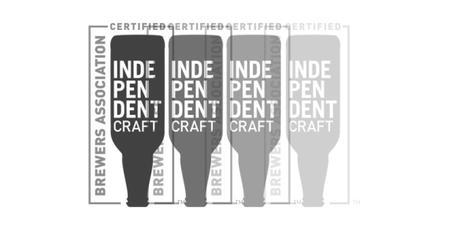
The Brewers Association has created a new "independent" logo for businesses to display on beer packaging. As for its value as a good or bad thing, I'll leave it to others.
This move is really interesting, as it fits so well within the BA's mission and pairs perfectly with another recent decision to reserve certain kind of sponsorships for "craft"-defined breweries only at their annual Great American Beer Festival. However, the backlash (and support!) on social media and elsewhere shows there is more to consider than just the questionable visuals of the logo itself.
On the heels of research presented in coordination by Nielsen and Brewbound that showcased how certain buzzwords and phrases resonate with beer drinkers, the Brewers Association rightfully flaunted the top finding: that "independence" matters to buyers . This connection will no doubt be cited as a worthy reason for the new branding, but the use of this story by the BA only tells part of the survey's results.
In a story recapping its joint poll, Brewbound notes that 81% of "craft beer consumers were familiar" with phrases of "independent" and "independently owned" in relation to beer. However, Nielsen senior vice president of beverage alcohol practice Danny Brager also mentioned this important caveat, paraphrased by Brewbound's Justin Kendall:
Even though consumers say they understand the terms "independent" and "independently owned," there remains the question of whether they actually know about ownership changes and if those would actually affect their purchasing decisions, Brager said. For example, did consumers who said they would stop purchasing Wicked Weed's beer following Anheuser-Busch InBev's acquisition of the Asheville, North Carolina, brewery actually follow through with that promise. Even so, if a brewery operates outside of its parent company, it may matter to consumers.
So while the phrase "independent" matters, it may not resonate in the specific way the Brewers Association is saying it does. Certainly a reason to have a logo if the goal is to make this an issue of awareness in the future, but questionable in terms of prevalence at the current time.
In addition to this, Brager also commented for a story posted on the Brewers Association website (emphasis in caps pasted directly from story):
Within that survey, several more "generic" marketing terms that can span ANY category seemed to be very relevant to, and resonated with, the craft beer consumer. Some examples of those terms include: innovative, limited edition, drinkable.
This response matters because it highlights the underlying issue with assuming customer interest in "independence" aligns exactly with what the BA's interest may be: these terms are buzzworthy with consumers in general and with beer. While some words like "hops" or "sour" in the context of a survey about beer may be straight forward, asking about phrases like "innovative" or "independent" are broad to all sorts of customer decisions.
Take, for example, the rise of interest in Small Business Saturday, an annual day that falls each November. Between 2011 and 2016, the number of reported consumers shopping at a small (and independent?) business grew by about 12 million, hitting a high of 112 million in 2016, a 13% increase from the prior year. In addition, American Express, a sponsor of the "holiday" that 72% of US consumers were aware of the day.
This is just one example showing how the idea of "small and independent" - a phrase now used by the Brewers Association to describe its members in lieu of "craft" - is part of the general lexicon for American consumers. For a host of reasons, "independent" as an adjective to describe a business is important, not just when it comes to beer.
It's also worth considering is being polled in relation to importance of "independence." For the Brewbound/Nielsen research, a total of 2,000 drinking-age adults were surveyed, which included 773 self-identified regular craft beer drinkers - people who drink "craft" several times a month. That nearly 40% of respondents fell into this category is important. If we're talking about people who drink craft, these people are typically going to be younger (Millennials being the predominant generation drinking craft), more educated and with higher salaries, meaning they also have leisure time and ability to care about whether their shopping is done at an independent business. It's only natural they would be familiar with "independence" as it relates to beer, especially in terms of this demographic's relationship with things like the "locavore" and "shop local" movements.
So while there is certainly a connection to how and why independence matters to beer businesses and drinkers alike, the answers may not be as straight forward as "this logo is going to be a game changer." All this is beyond arguments issued by industry professionals, brewers and fans, noting that the implementation of a logo in the first place can be problematic. What happens if a small and independent brewery chooses not to display the logo? How will their consumers view them then? Will they question their independence?
Aside from use and placement of a logo, this all brings us to a bigger issue: s mall and independent brewers should be finding ways to tell the story of value behind "small and independent" every day. Actions louder than words (or images), and all that.
A logo isn't a panacea.
Bryan Roth
"Don't drink to get drunk. Drink to enjoy life." - Jack Kerouac

